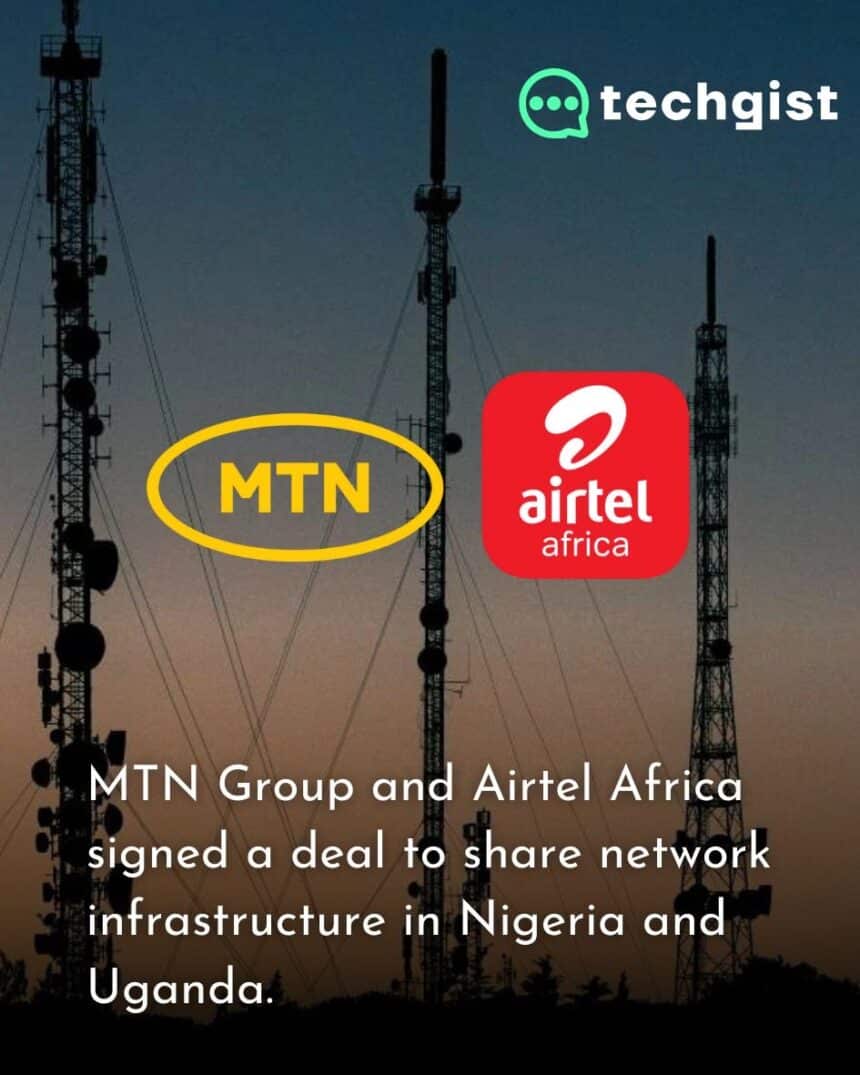In a groundbreaking move for Africa’s telecom landscape, MTN Group and Airtel Africa have announced a pioneering partnership to share network infrastructure in Nigeria and Uganda.
Announced in late March 2025, this partnership promises to shake up how connectivity is delivered, potentially lowering costs and bringing reliable internet and mobile services to more people than ever before.
Hot on the heels of Visa’s recent pledge to build a data center in Nigeria, this deal signals a surge of confidence in the region’s tech ecosystem.
So, what’s behind this collaboration, and what does it mean for users and the industry?
The Deal: Sharing the Backbone of Telecom
Imagine two telecom giants deciding to split the bill on a massive project instead of going it alone. That’s essentially what MTN and Airtel are doing. They’re pooling key infrastructure—think cell towers, base stations, and fiber optic networks—to streamline operations in Nigeria, Africa’s largest mobile market, and Uganda, a fast-growing digital hub.
This isn’t about merging their brands or services; MTN and Airtel will remain fierce competitors, each vying for customers with their own plans and pricing. What they’re sharing is the costly, behind-the-scenes hardware that keeps calls clear and data flowing.
Why Now? Cost, Coverage, and a Changing Market
Building and maintaining telecom networks is no cheap feat!
In Nigeria, where power shortages force reliance on diesel generators and the naira’s volatility jacks up import costs, the expense is even steeper. Uganda faces similar hurdles, with rural areas often left in connectivity dead zones due to the high price tag of expansion.
By sharing infrastructure, MTN and Airtel can slash these costs—potentially by millions—while extending their reach without duplicating efforts. It’s a win-win: they save cash, and underserved communities get a shot at better service.
This move also reflects broader pressures. Data demand is skyrocketing— Nigerians streamed over 700,000 terabytes in 2024 alone, per the NCC—yet profit margins are shrinking. Add global tariff wars and economic headwinds, and it’s clear why collaboration makes sense. Sharing isn’t new globally (Europe’s been at it for years), but in Africa, where competition has long been cutthroat, this marks a bold shift.
A Boost for Connectivity—and Maybe Your Wallet
For users, the upside is tantalizing. Picture fewer dropped calls in Lagos traffic or faster Netflix buffering in Kampala’s outskirts. Rural areas, often ignored due to low ROI, could see towers pop up sooner. MTN and Airtel haven’t promised price cuts yet, but lower operational costs could trickle down to subscribers.
In Nigeria, where broadband penetration lags at 44% despite a 70% target, this deal might nudge the needle closer to universal access. Uganda’s digital economy, already buzzing with mobile money, could leap forward too.
Visa’s Vote of Confidence
This telecom tie-up doesn’t exist in a vacuum. Just weeks ago, Visa announced plans to establish a data center in Nigeria, a nod to the country’s burgeoning tech scene. With fintech giants like Flutterwave and Paystack calling Lagos home, and startups raising over $1 billion in 2024, Nigeria’s pull is undeniable. Visa’s investment suggests global players see stability and growth potential—qualities MTN and Airtel are banking on with their infrastructure bet. Together, these moves paint a picture of a tech ecosystem ready to flex its muscles.
What’s Next for MTN, Airtel, and Africa?
The Nigeria-Uganda pact is just the start. MTN and Airtel are already eyeing expansion to Rwanda, Zambia, and beyond, hinting at a regional playbook. If successful, this could inspire other African telcos to follow suit, reshaping how connectivity scales across the continent.
Challenges remain—regulatory hurdles, maintenance logistics, and ensuring fair competition—but the potential payoff is huge: a more connected Africa at a fraction of the usual cost.
The Bottom Line
MTN Group and Airtel Africa’s network-sharing deal is a pragmatic step toward a smarter telecom future. It’s about cutting costs without cutting corners, boosting coverage where it’s needed most, and riding the wave of Nigeria and Uganda’s tech momentum. Paired with Visa’s data center plans, it’s a signal that Africa’s digital transformation is accelerating—and the world is taking notice.
For users, it might mean better service soon; for the industry, it’s a blueprint for survival in a tough market.
Network Infrastructure Sharing: MTN and Airtel Team Up to Transform Connectivity in Nigeria and Uganda

Leave a comment
Leave a comment






